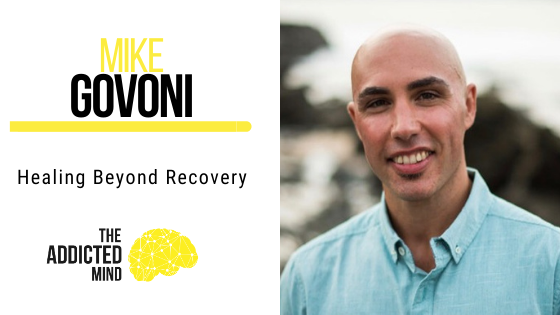Addiction is a response to pain and trauma. Reaching out and making yourself vulnerable is challenging when you’ve been traumatized. You may not trust people and you may not trust the process. So what needs to be done to discharge the trauma off your body and break free from the symptoms – addiction being one of them?
In this episode, Duane talks with Mike Govoni, an integrative holistic recovery coach who specializes in healing not only addiction but trauma as well. He has extensive experience in helping addicts overcome trauma and free themselves from addiction, a path that he has walked personally.
Mike was traumatized in utero, which led to his early-onset illness in long-term recovery. This set him up for addiction. As a result of childhood trauma, pain, and suffering, Mike escaped through alcohol and drugs at an early age. He smoked his first joint at 11. By the time he was 18 years old, he got addicted to oxycontin – the first substance that took his soul out of him. He had always thought it was under control until he finally had to reach out for help. When he was hit with depression, his mom brought him to a 12-step meeting which was his first exposure to life in recovery. At that point, he got sober and has been for about 16 years now.
Interestingly, he never knew he was suffering from unprocessed unhealed trauma. It took the universe to conspire for his awakening and for him to have a mystical experience that led to profound healing. That’s what led him on the journey to what he does today.
Today, Mike and Duane are going to have an in-depth conversation about trauma, early trauma, how it hides in the body, and how we can begin to process through that trauma to be able to release it, find freedom, and be our authentic selves.
In this episode, you will hear:
- Mike’s entry into addiction and where his childhood trauma came from
- How addiction is related to trauma
- What keeps people from seeking help
- Why trauma starts in utero
- What trauma really means and how it’s been programmed in the subconscious
- How our nervous system can help discharge the trauma
- The role of others in the process of healing yourself
Key Quotes:
[07:18] – “Addiction is a response to pain and trauma. And reaching out and making yourself vulnerable is challenging when you’ve been traumatized.”
[07:58] – “If you look at the work of Stanislav Grof, who is a well-known psychotherapist, he talked about birth as the first real trauma.”
[09:28] – “Trauma is really misunderstood. There’s a lot of different definitions of trauma.”
[10:52] – “You can be in long-term recovery, and still be suffering from the symptoms of trauma.”
[13:23] – “Many of us have traumas that we have suppressed and repressed so much that it’s below consciousness.”
[27:11] – “The nervous system naturally knows how to move through the cycle and discharge the trauma.”
[32:56] – “When you’re stuck in survival mode, you don’t have access to your creativity or have access to the full potential of who you are.”
[33:25] – “It’s no wonder why people in addiction isolate and don’t have access to this social engagement system. We’re social primates. We are built for connection. We are built for touch.”
Subscribe and Review
Have you subscribed to our podcast? We’d love for you to subscribe if you haven’t yet.
We’d love it even more if you could drop a review or 5-star rating over on Apple Podcasts. Simply select “Ratings and Reviews” and “Write a Review” then a quick line with your favorite part of the episode. It only takes a second and it helps spread the word about the podcast.
If you really enjoyed this episode, we’ve created a PDF that has all of the key information for you from the episode. Just fill in your information below to download it.

